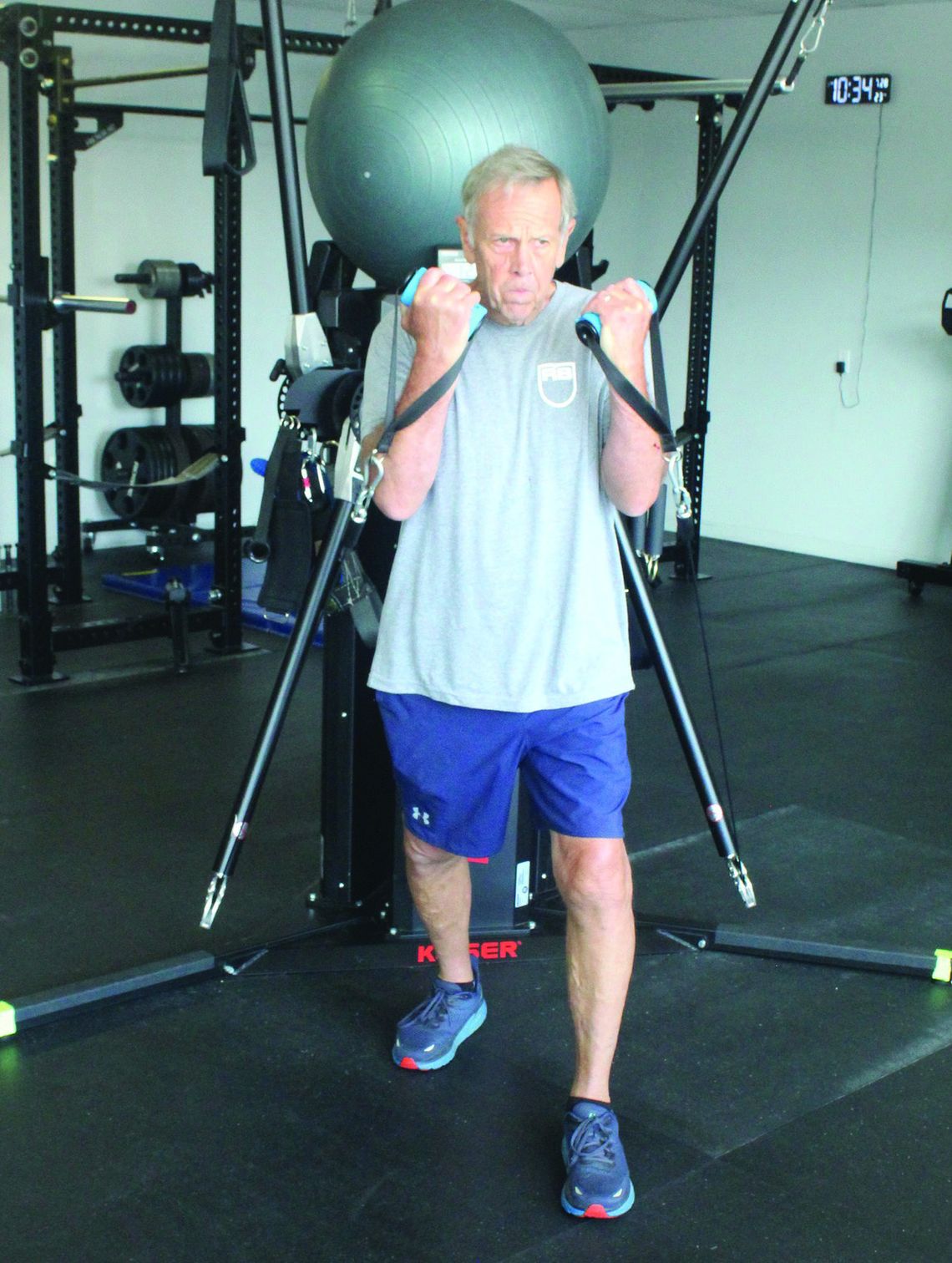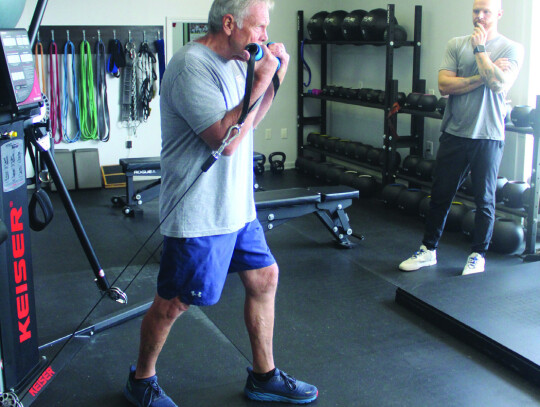Just a week before his 71st birthday in May, John Harb accomplished what seemed impossible two years earlier.
On May 3, with his trainers and retired Lt. Col. Pat Looney in attendance, Harb recorded a firstclass score for his age group on the U.S. Marine Corps Physical Fitness Test (PFT). The achievement came just two-and-half years after he was diagnosed with throat cancer.
Between the diagnosis and the accomplishment was a long process to get Harb in incredible shape.
Harb retired to Lexington with his wife Maria five years ago after serving as the assistant dean for scientific operations and director of the office of biotechnology at Albert Einstein College of Medicine in Bronx, N.Y. It wasn’t Harb’s first time living in Lexington. From 1991-1994, he and his sister Susan owned and operated the Harbs Bistro on Washington Street in downtown Lexington.
In the fall of 2020, Harb was diagnosed with throat cancer. “I was assured by the doctors that it was treatable and curable but that the process to get there would be difficult and hellish and brutal,” he said.
He then started a combination of radiation, five days a week for seven weeks, and chemotherapy. His last treatment was in Christmas of 2020, and he was in remission, but it wasn’t until March of 2021 that he felt well enough to start getting out again.
“By that point, I was really just a shell,” said Harb. “I had lost 40 pounds. Whatever muscles I had were gone. I had no strength. I had no stamina.” Even walking 150 feet from his garden to his house, Harb had to sit down and catch his breath.
With the encouragement of Maria, he decided to get a personal trainer to get back into good physical shape. He’d heard about Rockbridge Barbell, a local gym that opened in 2020 and focuses on weight training and conditioning. Harb decided to sign up to start working with two personal trainers – Red Dowdell, the owner of Rockbridge Barbell, and Gabe Inman.
After stating to Dowdell that his goal was to get fit, Harb realized he should be more specific than that. That’s when he came up with the idea to take on the Marine Corps FPT.
One of the main reasons he chose to take on the Marine Corps PFT was that his son is an officer in the U.S. Marine Corps. “I have a sense of the high standard that the Marine Corps holds its members to and the pressure to perform well on the physical fitness test. I said, well, this is a tangible measure of fitness, and it’s a high standard, it’s a high bar, but it’s also prorated by age.”
There are eight age groups in the Marine Corps PFT, and Harb is in the 51+ age group, the oldest one.
Dowdell remembered his own reaction well. “John came to me, and he told me this one day, and I was like, ‘That is a lofty goal. Let’s see how much progress we can make towards it. Let’s start working towards it and see where it goes.’” A passing score in Harb’s age group on the Marine Corps PFT is 150, and a perfect score is 300. Harb eventually changed his goal to record a first-class score (235 or above) for his age group. Harb ended up with a score of 244, a first-class score for the 51+ age group and the age group below Harb’s, from age 46-50.
The test consists of three parts: pull-ups, a plank pose and a run or row. Dowdell was confident Harb wouldn’t have trouble with the plank pose because “John’s core strength is unbelievable, especially for his age, but just period is really good.”
The pull-ups were more of a challenge because, when Harb first came to Rockbridge Barbell, he couldn’t do one pull-up. However, with good coaching from Dowdell and Inman, Harb ended up doing 11 pull-ups the day of the test, and his personal record is 13.
Harb was originally going to try to do the run, but because his knees weren’t good, he opted to do the row. He had only been on a rower once before working with Dowdell and Inman, and they didn’t start the row training until three or four months before the test. On the day of the test, Harb used a Concept2 rower from Virginia Military Institute.
The test took place at the VMI track at Foster Stadium, and the trainers and Harb brought in Lt. Col. Pat Looney to monitor it. “I felt like it needed to have that credibility,” said Harb.
Dowdell has a strong VMI connection, so the location was natural. He played baseball for VMI and graduated in 2016 before working as a personal trainer for several years for professional baseball players for the Washington Nationals and professional soccer players for the D.C. United.
Harb said the process of training for and completing the PFT “was really a team effort. I had two top-notch professionals (Dowdell and Inman) who knew how to get me there. Without them, I can’t imagine that I could’ve really attained this goal. I had to put the work in, but I had two professionals that were getting me there, and I had tremendous support at home.”
Harb noted that his wife’s first goal “was to become a nutritionist, so she knew how to prepare meals that were healthy and nutritious that helped me keep my strength up and my weight down. So, I really did feel like I was just part of a team.”
Right after taking the test, Harb said, “When I did it, I think my first feeling was relief. I know, when I was doing the row, to partly motivate myself, mentally, I thought back through the whole process. Having the cancer, getting over it, that was like motivation. When I finished it, one, it was relief. I did it. The next, there was this sense of accomplishment. Yeah, I did it! The next feeling was, I should’ve gotten a 250.”
Harb’s next big goal is to get a first-class score for all age groups, but he knows that is a lofty one. However, it took him 20 months to prepare to take the test the first time, and it might take another 20 months to achieve this new goal, he said.
While he didn’t want a lot of attention for his accomplishment, Harb said he learned valuable lessons that will hopefully inspire others wanting to achieve their own goals.
Harb said people setting goals should ask themselves, “Do you want to accept that as the new status quo, or do you want to get better?”
“It doesn’t have to be [beating] cancer,” added Harb. “It could be any disease. It could be a physical injury. It could be an emotional upheaval. Setting goals gives you something to focus on, to aspire to, and if you work towards it diligently, even if you don’t get there, you’re probably going to see improvement that will get you to a better place.”
.jpg)




